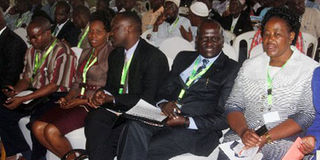TSC sets new rules for teachers as union objects

Secondary school headteachers attend their annual conference at Wild Waters in Mombasa on June 20, 2016. Some teachers have teaching certificates and those who don’t have them will have to obtain them. PHOTO | LABAN WALLOGA | NATION MEDIA GROUP
What you need to know:
- Knut National Executive Council member Dan Aloo said teachers’ accounts cannot be audited as details of their wealth were already with the Kenya Revenue Authority.
- The proposed auditing is part of a set of new rules for teachers that also seek to weed out unprofessionalism.
- The regulations cover teachers in public primary and secondary schools, tertiary colleges, national polytechnics, institutes of science and technology, among other institutions.
Teachers on Monday rejected a proposed audit of their wealth once they leave the profession.
Speaking on the sidelines of this year’s Kenya Secondary Schools Heads Association conference at the Wild Waters Centre in Mombasa, they called the planned audits a violation of their rights.
Kenya National Union of Teachers (Knut) National Executive Council member Dan Aloo said teachers’ accounts cannot be audited as details of their wealth were already with the Kenya Revenue Authority.
Knut chairman Mudzo Nzili said the union would share its views on the regulations after studying them.
“We are a professional body and will only give our views after reading it,” said Mr Nzili.
But Secretary-General Wilson Sossion was dismissive: “Just hold on. We did not come here to be given library books.”
And, at the Mombasa Beach Resort, the Teachers Service Commission launched a new code requiring would-be teachers to be registered and licensed.
According to the Code of Regulations for Teachers, all registered teachers would be required to renew their teaching certificates after undertaking a continuous professional development programme, failing which the licences would be suspended.
On the wealth audit, Mr Aloo, also the Mombasa County Knut executive secretary, said: “Why audit us, why audit our salaries? We are not thieves. We have declared our wealth everywhere in the P9 forms and many more documents. This is infringing on our constitutional rights and we cannot accept it at all.”
The proposed auditing is part of a set of new rules for teachers that also seek to weed out unprofessionalism.
They also prohibit any teacher from acting as an agent of a political party or as a contestant.
Mr Aloo said this was also a violation of teachers’ rights, adding that like any other citizen, teachers were free to align themselves to political parties of their choice.
“If any teacher wants to vie for a political seat, let them go ahead because the Constitution allows us. No one has the right to stop us,” he said.
The new rules bar teachers from making a request to, or exert pressure on, a learner for sexual activity or favour.
The rules also forbid teachers from sending away students from school earlier than 6am or later than 12pm except in cases of emergency. But Mr Aloo said teachers are not sex pests or criminals.
CONSTITUTIONAL
The regulations, launched by TSC Chief Executive Nancy Macharia and chairman Lydia Nzomo, apply equally to those wishing to teach in public and private schools.
In the far-reaching reforms, the TSC hopes to have a say on who teaches in private schools, some of which hire untrained and rogue teachers.
For instance, a person who has been convicted of a sexual offence against a child or any criminal activities will not be allowed to become a teacher.
Similarly, any teacher employed by the TSC and is implicated in sexual abuse of learners will be deregistered and barred from working as a teacher both in public and private schools, while administrators who recruit such people will be prosecuted.
TSC bosses defended the new rules, saying they were in line with the Constitution and would be implemented immediately.
The regulations cover teachers in public primary and secondary schools, tertiary colleges, national polytechnics, and institutes of science and technology, among other institutions.
Some of the over 200,000 TSC teachers have teaching certificates and those who don’t have them will have to obtain them.
The professional development programme includes school management, curriculum implementation, information communication technology, teaching methods and financial resource management, among others.
Dr Nzomo and Ms Macharia noted that the documents alongside the code of regulations, strategic plan and teachers’ handbook were arrived at in consultation with teachers' unions and other education stakeholders.
They added that they would improve teaching and learning and are in line with devolution.
“We are very frank. The contents of these documents are embedded in the Constitution and (were done) in consultation with education stake holders. Knut was involved during the process of their establishment,” said Dr Nzomo.
She added: “The code of conduct has been revised to address what is contained in the Constitution. Strategic plan 2015 to 2019 was founded on article 237 of the Constitution, which spells the mandate of TSC.”
TSC MANDATE
Ms Macharia said the old regulations put more emphasis on personnel issues than on services, resulting in poor-quality teaching and learning.
“The first code of conduct for teachers was published in 1972, it was then revised in 1976, 1986 and 2005, but it laid more emphasis on employment benefits and entitlements, including leaves, allowances, pensions, gratuities, promotion, among other things, while there was little emphasis on teaching standards and provision of quality education,” added Ms Macharia.
She said article 237 empowers the commission to review the standards of education.
It also gives the TSC the authority to advise the government on matters relating to the teaching profession, added Ms Macharia.
Meanwhile, new features of the regulations include fresh roles for the TSC quality assurance and standards officer, who is required to carry out assessments and submit reports to the commission for appropriate action.
Reported by Daniel Nyassy, Galgalo Bocha and Rebecca Okwany




